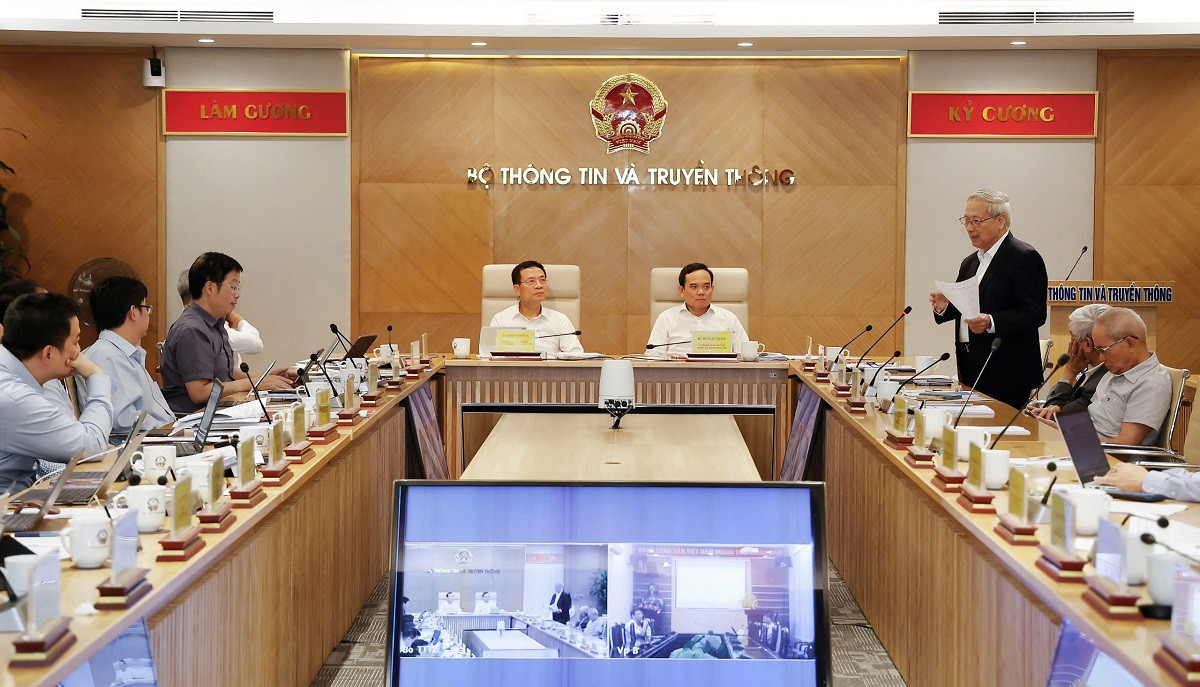
On September 12, 2024 in Hanoi, head of the Party Central Committee's Economic Commission Tran Luu Quang and Minister of Information and Communications Nguyen Manh Hung co-chaired a conference on collecting opinions about three projects to be submitted to the Politburo.
Hung said the Party Central Committee's Economic Commission has been assigned the task of presiding over the compilation of the review of the 5-year implementation of Politburo’s Resolution 52 dated September 27, 2019 on policies for Vietnam to participate in the fourth industrial revolution.
The Ministry of Information and Communications (MIC) has been requested to compile two projects, including one on reviewing the 10-year implementation of Politburo’s Resolution 36 dated July 1, 2014 on promoting the application and development of information technology to satisfy requirements for sustainable growth and international integration; and one on building a new Politburo resolution on national digital transformation and digital socio-economic development.
The new Politburo’s resolution's name is tentatively called "the Politburo’s Resolution on accelerating digital transformation, science and technology and innovation, leading Vietnam to the new era".
Hung requested experts, scientists, representatives of associations and ICT firms to give opinions on these three projects and emphasized the role and importance of the 4.0 industrial revolution and digital transformation to development, the orientation, mechanisms and policies to develop digital technology in the next 20 years.
Discussing the name of the new resolution, Nguyen Nhat Quang from the Vietnam Software & IT services (VINASA) suggested naming it "Resolution about digital transformation revolution".
“Vietnamese Party Chief and State President To Lam has published a very important article about digital transformation, where he for the first time used the phrase ‘digital transformation revolution’, striving for a new era when the nation witnesses a strong rise with digital transformation,” he said.
“We once ‘liberalized’ agriculture with Resolution 10 which amended the regime so that farmers have the right to do business on their land, thereby creating a renovation for the country. And we hope that the resolution on digital transformation will also be groundbreaking like the Resolution 10,” he added.
He said it is necessary to state the resolution's purpose of "building and creating institutional regime for new production methods and development methods".
Meanwhile, discussing the solutions to perfect the legal institutional regime, he said that it would be better to clarify that Vietnam needs to expand institutions to regulate relations in a digital environment.
Agreeing with the representative from VINASA, former Minister of Science and Technology Nguyen Quan stressed that the promulgation of a resolution of the Party Central Committee like Resolution 10 in 1988 was needed.
If so, the resolution on digital transformation will have a higher level of position and importance. All instructions by the Central Committee and Politburo can be included in the new resolution, and the document will become part of the 14th Party Congress. The new resolution should assign an agency to prepare a project on the digital country.
An institutional revolution
The participants at the event all agreed that a new resolution with a revolutionary spirit and breakthrough like Resolution 10 was needed to create growth in the future.
“We talk about building advanced and modern digital infrastructure in the digital transformation and digital technology revolution. For a long time, businesses themselves have to spend their own money and fend for themselves. Why doesn’t the State spend money to build digital infrastructure? Revolution means changing our thinking. If digital infrastructure is considered essential national infrastructure, the State must spend a certain amount of money on investment,” said Mai Liem Truc, former Deputy Minister of Posts and Telematics.
Meanwhile, Quan, emphasizing that data are not only national resources but also national assets, expressed his concern that Vietnam still doesn’t have a law on data, which leads to many obstacles to the use of databases for activities in the national economy.
“Without data laws, the ability to integrate into the common national database and participate in international databases will be restricted,” Quan noted.
Binh Minh